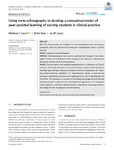Using meta‐ethnography to develop a conceptual model of peer‐assisted learning of nursing students in clinical practice

Date
2019-04Author
Subject
Metadata
Show full item recordAbstract
<jats:title>Abstract</jats:title><jats:sec><jats:title>Aim</jats:title><jats:p>The study presents the findings of a meta‐ethnographic study, developing a conceptual model for peer‐assisted learning for undergraduate nurses in clinical practice.</jats:p></jats:sec><jats:sec><jats:title>Design</jats:title><jats:p>Qualitative meta‐ethnography.</jats:p></jats:sec><jats:sec><jats:title>Methods</jats:title><jats:p>Meta‐ethnography was used to synthesize the findings of two ethnographic studies and a qualitative review related to the influence of peer‐assisted learning on student nurses in clinical practice.</jats:p></jats:sec><jats:sec><jats:title>Results</jats:title><jats:p>Four key themes were identified underpinned by six sub‐themes: (a) “Social” whereby “connecting with peers” is an important part in peer‐assisted learning. (b) “Enabling” peers through “collaborative support for advice and guidance” and “reducing anxiety/increasing confidence.” (c) “Organizational” aspects in peer‐assisted learning in “establishing structure and navigating practice” and “establishing the role of the PAL.” (d) “Learning” as a product of developing knowledge and skills through “sharing of practice experience” and “enhancing knowledge of care.” The conceptual model presents a structure outlining elements required for developing effective knowledge and skills through peer‐assisted learning.</jats:p></jats:sec>
Collections
Publisher
Place of Publication
Journal
Volume
Issue
Pagination
Recommended, similar items
The following license files are associated with this item:

